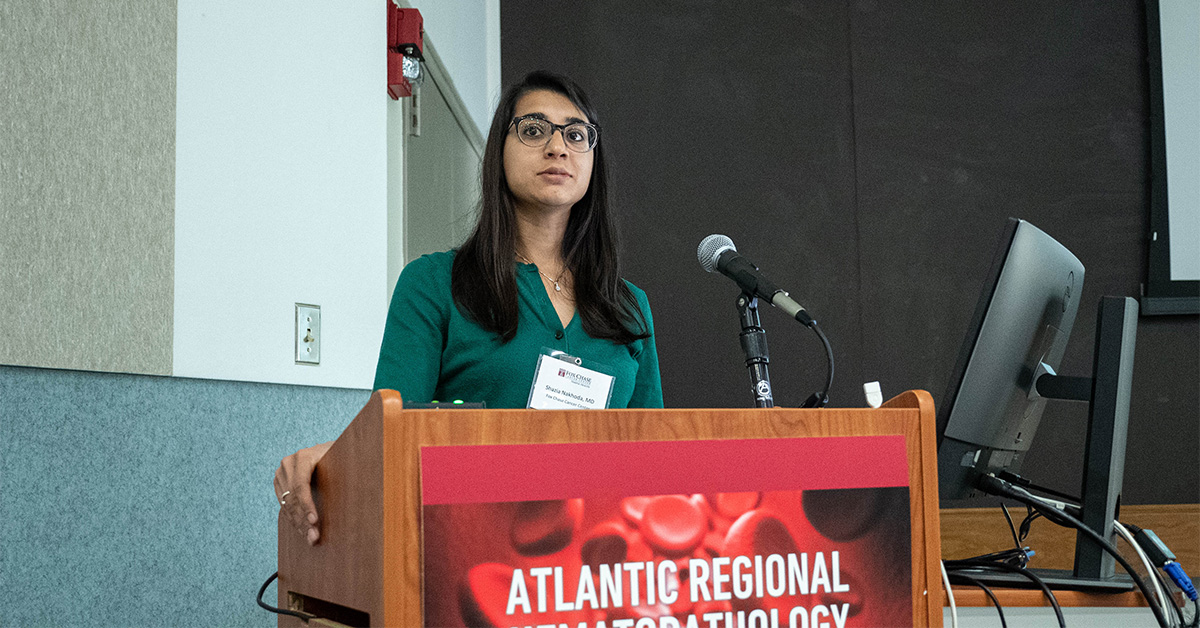
PHILADELPHIA (May 26, 2023) — Management of chronic lymphocytic leukemia (CLL) is a rapidly evolving field, so choosing between the growing number of effective, available therapies can be challenging for both physicians and patients.
Researchers at Fox Chase Cancer Center have developed a model that mimics patients’ tumor microenvironment that they believe has the potential to inform therapeutic decision making and presented a case study demonstrating the use of the model recently at the Atlantic Regional Hematopathology Meeting, which took place at Fox Chase.
The tumor microenvironment consists of non-tumor cells in the surrounding environment of tumors that often help tumor cells to grow. The model, however, works outside the patient’s body. Researchers collect tumor cells from patients, place them in a supportive environment, and expose them to different drugs to determine which drug or drug combination works best in fighting that patient’s tumor.
Y. Lynn Wang, MD, PhD, FCAP, a professor and the medical director of Molecular Pathology; Shazia K. Nakhoda, MD, an assistant professor in the Department of Hematology/Oncology; and Reza Nejati, MD, an associate professor and medical director of Clinical Laboratory Services, were co-authors on the case study.
“If we can develop and validate this type of test in the clinical setting it has the potential to be vitally important for patients. It could help us know what therapies will be most effective for each patient,” Nakhoda said.
“The model works like a clinical trial of a patient’s tumor against a panel of drugs so that the most effective drug can be selected for that particular patient,” Wang added. “It is essentially the practice of personalized medicine.”
The study detailed the case of a 70-year-old man with relapsed/refractory CLL who received second-line treatment with ibrutinib, a Bruton tyrosine kinase (BTK) inhibitor. About four years after the patient started treatment with the drug, disease progression was confirmed.
“While four years is a fantastic response, we have data now that shows that some patients can derive 10 years or more of disease-free survival with these BTK inhibitors in the front-line setting,” Nakhoda said.
The patient had developed a resistance mutation known as a BTK C481S mutation that commonly occurs in patients treated with BTK inhibitors. BTK C481S was discovered in 2014 by a group of researchers headed by Wang. A correspondence on the discovery was published in the New England Journal of Medicine and has been accessed nearly 70,000 times, Wang said.
His treatment was switched to a combination therapy of the BCL2 inhibitor venetoclax plus obinutuzumab, an anti-CD20 monoclonal antibody. Ibrutinib was initially discontinued but later resumed.
After one year on this three-drug combination, tests showed that the patient had undetectable minimal residual disease, an indicator that no disease was found after treatment.
After disease progression, prior to the patient’s mutation testing and therapy switch, his blood was collected and the CLL cells were cultured in the tumor microenvironment model. When tested, the cells from the patient showed resistance to single-agent ibrutinib and single-agent venetoclax, but sensitivity to a combination of the two drugs.
These results were consistent with the clinical response seen in the patient one year after he was treated with ibrutinib and venetoclax in combination with obinutuzumab.
“There is clinical trial data showing great results with the combination of a BTK inhibitor and venetoclax with or without anti-CD20 monoclonal antibody therapy in the front-line setting, but we don’t quite know which patients will benefit from this type of approach versus sequentially giving these agents to patients,” Nakhoda said.
“We know that combination therapies can reduce the risk of resistance by using a multipronged approach to target and kill off the cancer clones and prevent the development of resistant subclones that cause our drugs to stop working. The case that we presented demonstrates this exactly, both clinically and what we see in the laboratory.”
Nakhoda noted that this was a retrospective, proof-of-concept study. However, if this type of test is further validated, she said it could be more widely applied and potentially “change the landscape of how we treat lymphomas in the future.”